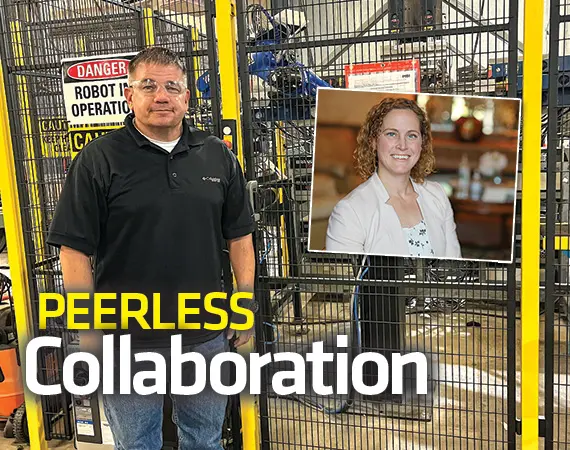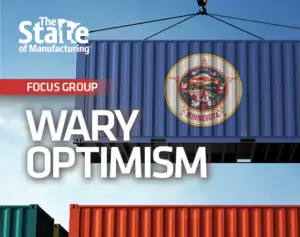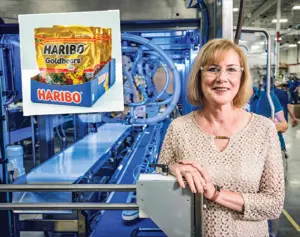Enterprise Minnesota oversees 10 regional peer councils across Minnesota that enable manufacturing executives to exchange ideas and nurture new connections in a confidential setting.
Ally Johnston, a business growth consultant who facilitates two regional peer councils for Enterprise Minnesota, including one in Hibbing, says they offer an opportunity for manufacturing leaders to exchange ideas.
“Essentially, the main goal of a peer council is for them to bring something that they’re challenged with at their current organization,” she says.
Often the results can be tangible.
Meet Todd Witherill and Jason Wobbema, central figures at MDI and AMGS, respectively, who met at the Hibbing peer council.
Their companies may contrast with one another in many respects, yet both have achieved mutual advances through the relationship they’ve forged since being introduced.
MDI — short for Minnesota Diversified Industries — got its start in 1964, as a St. Paul-based enterprise dedicated to helping people with disabilities find jobs. Today, the organization employs about 450 people statewide, with three of its four operations in Northeast Minnesota, including facilities in Hibbing, Grand Rapids, and Cohasset. MDI’s annual sales exceeded $30 million last year, and Witherill, the organization’s director of operations, says he expects to surpass that mark in 2023.
On the other hand, AMGS — short for Advanced Machine Guarding Solutions — is a young Hibbing startup that Wobbema founded during the pandemic. After a career installing robotic automation internationally, Wobbema moved back home to the Iron Range to launch his own business, dedicated to keeping machines and people safely distanced. His fast-growing enterprise now employs eight — twice as many people as it did at the start of the year.
Witherill says he and Wobbema met through a regional peer council in Hibbing at a time when MDI was struggling to find workers and looking for ways to automate some of its operations.
Witherill admits it was a tricky idea to introduce more automation to an organization that strives to create jobs, but the decision to automate was never about reducing MDI’s workforce. Rather, he says, it was seeking to ensure MDI’s continued competitive success in the marketplace and to relieve repositioned staff from some of the more repetitive work in the plant.
A pair of new industrial robots in Cohasset now quickly and efficiently lift, weld, and stack the plastic totes that remain the bread-and-butter of MDI’s business.
Wobbema advised MDI as the organization worked to identify and piece together the most efficient and economical robots for the work at hand. AMGS also supplied all the guarding systems needed to ensure humans and machinery would never unintentionally intermix.
Witherill says people with disabilities comprise roughly half of MDI’s work force at present.
MDI is a nonprofit, social enterprise that derives more than 95% of its revenue from operations. In addition to paying its workers an hourly wage, MDI also provides employees profit- and mission-based bonuses.
“We’re definitely an employee-first company. It’s one of our core values,” Witherill says.
MDI has customized two robots to its specific needs with the help of a consultant recommended by Wobbema, cutting the organization’s capital costs about in half by making the necessary modifications in-house.
Johnston agrees MDI occupies an unusual space.
“They really want to have jobs, and so the more competitive they can be and the more product lines they can offer, the more jobs they can offer to people. It’s a unique model,” she says.
She notes that targeted robotics could potentially open new doors to MDI.
“Increasing automation allows them to grow their capacity. I mean we know the pool of workers in the labor market is not very big. So, adding in more automation, allows them to get more product out the door, reduce lead times, improve quality, and reduce costs,” Johnston says.
Wobbema also advised MDI to send a couple of employees to Ohio for intensive training on robot programming and maintenance.
“That’s a huge journey for any manufacturer,” Wobbema says. “You can purchase all sorts of great equipment, but if you don’t have the people trained to support it, it will never work, because things can get really complicated.”
Witherill has no doubt that meeting Wobbema in the peer council last year yielded a positive outcome. “He helped us avoid pitfalls based on his years of automation experience,” he says.
Wobbema says the benefits flowed both ways.
Almost all of MDI’s wire-cutting and bending operations occur at its Hibbing facility, not far from AMGS. And the nonprofit possesses considerable buying power.
“We buy wire by the semi-load,” Witherill says. It comes on large spools that staff then unwind, run through a straightener, and cut to length.
Wobbema was duly impressed by the Hibbing operation and its economies of scale, touching off further discussion.
AMGS purchases a slightly different gauge wire that it welds into fencing for its safety enclosures. But there’s enough similarity in the companies’ supply chains that they continue to explore the possibility of MDI purchasing wire to meet AMGS’s needs and delivering it a couple miles down the road on an as-needed basis.
AMGS has often had to purchase wire in larger-than-ideal quantities, tying up capital that sits on the floor until it can be turned into product.
“Whereas, if he buys from us, I can invoice him every 30 days for just what he needs,” Witherill says.
While the drive to automate has preoccupied MDI, AMGS has been working to ramp up production to meet growing demand with an anticipated 15,000-square-foot expansion, nearly tripling the size of its current shop floor.
As a result, both Witherill and Wobbema have been so busy that it has been tough to find time to iron out a collaborative plan.
In the meantime, however, AMGS already is reaping some of the benefits of their discussions. Wobbema referred a new more competitively priced wire supplier to MDI. That vendor reciprocated by selling discounted wire to AMGS in smaller quantities.
So, what is a peer council anyway?
Ally Johnston, a business growth consultant for Enterprise Minnesota, says that often the in-person discussions at peer councils involve delicate matters that would be difficult for manufacturing executives to broach internally.
Building a sense of trust is important to the success of the group, says Jim Schottmuller, director of business development for Enterprise Minnesota, and he also manages the northeastern MN sales territory.
“These groups are designed for the high-level management manufacturing leaders who maybe have no peers in their companies,” Schottmuller says. “They may want to talk about an idea that could freak out their organization and hear about the good and the bad to consider in advance.”
Schottmuller also says personnel situations may be freely discussed, whether that involves staffing challenges or challenging staff.
“They have those discussions in sort of a ‘cone of silence.’ What you say in your peer group stays in your peer group. That’s one of the rules,” Schottmuller says.
He says that violating that highly valued confidence is clear grounds for expulsion.
“What’s nice about it is it’s a diverse group,” says Jason Wobbema, founder and CEO of AMGS (Advanced Machine Guarding Solutions) of Hibbing. “I think it’s great that you can bounce ideas off of people with different backgrounds and from different industries.”
“It is definitely a great way to connect with other manufacturers in your region. You really never know what is going to come out of that — good or bad,” Wobbema says with a laugh.
Enterprise Minnesota staff let the conversation go where it will.
“You know, Jim and Ally are just there to facilitate, and it’s more about what’s on people’s minds, about what they’re dealing with,” Wobbema says, noting that members rely mostly on one another for advice.
It’s also helpful that peer council members arrange to take a first-hand look at one another’s operations, says Todd Witherill, director of operations for Minnesota Diversified Industries (MDI).
“So, when you finally see what they’re going through, the condition of their building or whatever, it’s easier to give feedback based on what one or all of us have experienced in our past lives,” he says.
Johnston says she doesn’t want to get in the way as a facilitator but does want to make sure participants are getting something out of the experience, and so she strives to address topics of regional concern.
“We have a standing meeting every month of all the peer council facilitators, and one of our agenda items is making sure that we are getting ROI from organizing all these meetings, because we want to make sure the members who attend are finding value,” she says.
Ultimately, however, Schottmuller says much of the peer groups’ success relies on the participants and their engagement, plus their willingness to help one another.
“Enterprise Minnesota leads them. But they really become whatever the members what them to be.”
…
Featured story in the Winter 2023 issue of Enterprise Minnesota magazine.


